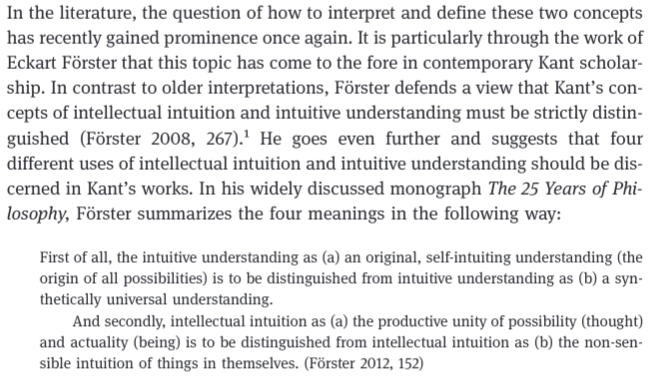Not exactly. You are trying to map Kant into modern cognitive psychology, which is a natural thing to do, but can only give us an idea of what Kant might have been getting at from our modern perspective, not how he actually thought about it. In his own mind he was not working with introspective data, nor was he trying to build a dynamical model of mental cognitive processes. In the Preface to Metaphysical Foundations of Natural Science he explicitly writes that "the empirical doctrine of the soul” will never be "a properly so-called natural science", see Steinert-Threlkeld's Kant on the Impossibility of Psychology as a Proper Science.
In his mind Kant reasoned from characteristics of knowledge (of the kind available to us) to functional elements that must be in place to make it possible, these are his signature "transcendental arguments". These elements included sensibility, productive and reproductive imagination, understanding, reason, the cryptic "transcendental unity of apperception", and of course the a priori forms of intuition. Characterizations like "highly momentary un-reflected state of passive receptivity", or anything else like that, would sound insufferably psychologistic to Kant. "Spontaneity" is not anything psychologistic either, it refers to the fact that concepts are not read off from empirical input, or seen through intellectual mindsight, as most philosophers thought before him, but rather are produced by the subject herself, as part of those functions necessary for having knowledge. Kant does mention in Critique of Pure Reason (A78/B103) that productive imagination is a "blind but indispensable function of the soul, without which we should have no knowledge whatsoever, but of which we are scarcely ever conscious" (A78/B103), but he is far from concerning himself with whether it is controlled, transitory, etc.
Now what of intuition? It helps to put it into the context of Kant's time as well. It has little to do with the modern colloquial meaning, something like what Peirce called "instinct for guessing right". According to Adams, the Latin term intuitio was introduced by scholastic authors:
"[For Duns Scotus] intuitive cognitions are those which (i) are of the object as existing and present and (ii) are caused in the perceiver directly by the
existing and present object. [...] According to Ockham, an intuitive cognition of a thing is that in virtue of which one can have evident knowledge of whether or not a thing exists, or more broadly, of whether or not a contingent proposition about the present is true."
But by the time of Kant belief in such special faculty of immediate knowledge was severely undermined by nominalists and then empiricists. Neither Platonic/Aristotelian theories of direct perception of forms, nor "rational intuition" based on "innate ideas" a la Descartes, etc., had much credibility left. So Kant's notion of intuition is much reduced compared to its predecessors. Here is Hintikka's description of how Kant understood intuition:
"The only notion of intuitiveness that was alive for him was a diluted one amounting to little more than immediacy. But Kant gave this immediacy a special interpretation. He thought that our representations (Vorstellungen) could relate to objects in two different ways, either indirectly, via the general characteristics (Merkmale) they have, or else directly, as particular objects. Thus intuitiveness came to mean for Kant simply particularity...
As a consequence, Kant does not normally speak of intuitive knowledge. Intuitiveness is for him in the first place an attribute of representations (Vorstellungen), not of items or kinds of knowledge. For him, intuitions in the minimal sense of the word are nothing but singular representations in contradistinction to general concepts. Intuition was not a source of truths or insights, but merely the medium of representing particulars, and intuitive knowledge was for him, not knowledge proclaimed to me by a special oracle called intuition, but simply knowledge obtained by means of such representations, especially by the method of exhibiting general concepts by means of their
particular representatives... There was for Kant no definitory link between intuition and sense-perception or imagination. Purely symbolic algebraic symbols could be "intuitive" merely because they represent particular numbers."
Kant himself talks not as much of intuition being the medium of representing particulars ("undifferentiated manifold of sensation" is more of that for the sensory cognition) as of individual intuitions as particulars there represented. The intuition/concept duality is explicitly analogized in the Amphiboly of Concepts of Reflection to Aristotle's matter/form. So it is as hard to put a finger on what intuitions by themselves are as on what Aristotle's prime matter/pure potentiality might be, divested of all form. In CPR A68/B93 we read that "whereas all intuitions, as sensible, rest on affections, concepts rest on functions", which suggests that intuitions might be akin to what is now called "qualia", but without the subjective/psychological connotation. However, as Pippin remarks in Kant on Empirical Concepts, the role of intuitions remains murky. He does try to offer a reconstruction:
"That is, relatively little attention, either in Kant or in the literature, has been devoted to the positive details of his theory of empirical knowledge, the exact way in which human beings are in fact ‘guided’ by the material of sensible intuitions... Any intuited ‘this’ can be a ‘this-such’ or ‘of-a-kind’, or, really determinate, only if a rule is applied connecting that intuition (‘synthetically’) with other intuitions (or remembered intuitions)
‘in one consciousness’. Or, finally, to say that ‘one’ concept includes
or refers to ‘many’ representations is not to assert a problematic relation between one abstract entity (like a universal) and many other entities. It is only to express that a rule can be applied in many different instances of intuiting. More generally, we can say that concepts thus do not refer to anything; they classify conceptual activities and are thus used universally and do not name a universal.’"

